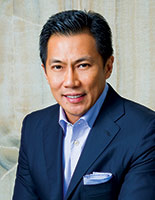The Power of 3
Three Seaver alumni who met as young men are now changing Indonesia’s infrastructure at the leading energy company in the country.
Thirty years ago Arsjad Rasjid (’93) waited for his mother in a boarding school parking lot in San Marino, California. He unpacked his luggage while she registered him for his first day of classes.
At 15 years old, he had just migrated from Indonesia and did not know a soul at Southwestern
Academy. Two boys noticed him unloading the car and rushed to help. One of them was
Agus Lasmono (’93), who now joins Rasjid and Wishnu Wardhana (‘93) at the helm of
PT Indika Energy Tbk, the leading integrated energy company in Indonesia. That day
Rasjid and Lasmono became fast friends when they discovered they were both from the
same country, 8,000 miles away from where they stood. Rasjid felt the same connection
with Wardhana, another Indonesian transplant, whom he met as an engineering student
at USC prior to transferring to Pepperdine to pursue business economics. And over
the course of the next 25 years, the three men have worked together to aid in the
development of their homeland through Indika Energy.
The company, which was officially incorporated in 2000, is Indonesia’s leading integrated
energy company and the third-largest producer of coal in the country. Indika focuses
on how energy relates to Indonesia’s development and finds ways for these interconnections
to be strengthened to promote economic and social progress.
“Indonesia has almost everything from rich resources to young and productive demography,
and strong macroeconomic policy to political stability. As an energy company, we are
among those who contribute to providing the resources needed to run things in life,”
explains Rasjid, vice president director and group chief financial and operating officer.
He goes on to say that Indika directs businesses in ways that bring value to both
citizens and stakeholders.
“The spirit we keep as an Indonesian company is to continuously improve and set new
benchmarks for the industry and beyond on our operational or service excellence, business
integrity, governance, and social responsibility.”

Arsjad Rasjid
Most important to the three men is taking part in the betterment of Indonesia. After
graduating from Pepperdine, Rasjid returned home to Jakarta to work for Mistubishi
Motors as deputy director of finance. After dipping his feet into the automotive industry,
he switched gears and became a key player in developing Indonesia’s digital presence
with cable television in the mid-1990s. The goal was to help the country transition
from satellite to multimedia, similar to Time Warner in the U.S.
In-between his roles as director of programming there and as a director at a programming
company creating interactive games for television programs, Indonesia became gripped
by the 1997 Asian financial crisis, requiring corporations across Asia to restructure.
Lasmono, vice president commissioner of Indika, who also returned to his home country
after graduation, recalls, “It was a very difficult time for Indonesia and many businesses
faced tough challenges of simply surviving—including my family business.”
Lasmono’s father was a top executive at Salim Group, Indonesia’s largest conglomerate,
and was in ill health at the time. His various investments—several hundred—were not
controlled by a single entity and were in need of a well- thought-out plan to add
structure and stability to myriad assets. Rasjid, well- versed in both financial and
technical aspects of thriving corporations, jumped at the chance to help.
Their plans soon shifted when the prospect of energy fell into their laps. When a
power plant project was proposed to the team, “we remembered that Wishnu’s family
was in energy, so Agus and I went to him to discuss whether we wanted to go into business
together. That’s where Indika started.”
Before then, Wardhana had cofounded two companies—Mahaka Group, a mining company that
evolved to incorporating a multimedia holding company with various businesses, as
well as Teladan Resources, an investment holding company, and Teladan Prima Group,
an agricultural company.
“At the time, the country’s economy was strong and the political situation was stable,”
says Wardhana. “Indonesia was an emerging country with its potential and opportunities
very much unknown to the outside world.”
In 2002 the team began by taking over a British Petroleum (BP)-owned petrochemical
company, PT PENI, the only one in operation in Indonesia at the time. “We proposed
to them a better chemical business,” recalls Rasjid. “We were not the highest bidders,
but we were able to recommend a plan that BP actually liked, so we bought the company
for $50 million.” Challenged by the company’s management control, Rasjid and his team
sold it one year later for $60 million.
While in the process of making the sale, the team took on a new project: building
power plants in Indonesia. Namely, coal.
“When we looked at the map of Indonesian economy, one of the key sectors we identified
was energy,” says Lasmono. “Indonesia is a large country with huge economic potential,
but the growth potential is constrained because of limitation in its infrastructure.”
“One of the key infrastructures for its economy is energy. When we looked further
into this problem facing the economy, we saw opportunity to participate and build
a strong business.”
They looked to China for financial backing and made a fateful discovery while meeting
with power companies in Beijing: Chinese political policy regarding energy was about
to change. “China wanted to follow the U.S.,” says Rasjid. “They demanded that 50
percent of their coal could not be exploited and that supply and demand was changing.”

Wishnu Wardhana
Indika tapped Malaysia to buy the raw materials to meet China’s supply demands. Eventually,
they launched the project to build a 4,600 megawatt power plant in Indonesia and purchased
51 percent of shares from a company that was in the process of reducing their assets.
Now Indika provides integrated energy solutions through its diversified investments
in the areas of energy resources, energy services, and energy infrastructure. “It’s
about participating in the whole value chain of energy production,” says Lasmono.
Indika’s strategic investments lie in the areas of coal production (PT Kideco Jaya
Agung); oil and gas engineering, procurement, and construction services (PT Tripatra
Engineers and Constructors); coal engineering, mining, and construction (PT Petrosea
Tbk); logistic and shipping services (PT Mitrabahtera Segara Sejati Tbk); and a power
generation project (PT Cirebon Electric Power).
“I think this is my personal passion to take part in the betterment of the country,”
explains Rasjid. “Even now the world starts to realize that indeed Indonesia is the
new center of global growth, but the challenges remain big, requiring joint effort
of many parties in both government and private sectors.”
For Lasmono, his part in Indonesia’s development is a requirement. “As a native Indonesian,
it is my obligation to help develop the country by resolving one of its greatest needs:
providing affordable energy supply to its economy,” he says. “At the same time, this
presents us with an opportunity to build profitable businesses and generate employment
and other opportunities for fellow Indonesians.”
Indika plays a significant role in nation-building and works with Paramadina University
in Jakarta to promote education in remote areas of the country by providing scholarships
and fellowships to students. “Nation building requires a strong corps of leaders and
those leaders must be well educated,” Rasjid asserts.
“We hope that this way Indika Energy can help plant the seeds of the nation’s future
leaders across the archipelago.”
Wardhana’s contribution even goes beyond the national border. Recently, he was appointed
as the chair of the Asia- Pacific Economic Cooperation (APEC) Business Advisory Council
(ABAC) reporting to the 21 APEC Leaders— presidents and prime ministers—of the APEC
member economies and also the chair of APEC CEO Summit 2013. In that capacity, he
expressed his confidence in Indonesia’s ability to play an important role as one of
the main players in the world’s production chain. Especially, he explained, with the
enormous young and productive workforce available in the country.
“Being involved in this energy development, I personally hope to support the country’s
economic growth which in turn brings welfare to the people,” says Wardhana. “Moreover,
being in the driver’s seat of an influential energy company, I can contribute further
by ensuring good mining and corporate practices which lead to a more sustainable development.”
Together, Rasjid, Lasmono, and Wardhana comprise a powerful team of nation-builders
whose relationship is the ultimate foundation for business. The trio, who recently
made a generous gift to Pepperdine, credits fundamental values such as trust, fairness,
and openness, while always maintaining a high degree of professionalism in managing
their respective roles as leaders of the company.
“All the good macroeconomic statistics that Indonesia has enjoyed thus far rely heavily
on few centralized economic centers in Java,” says Rasjid. “Now imagine what will
happen if economic development in the other parts of the country is successfully triggered.
If people like us don’t help shape the country’s bright future, then who else will?”
